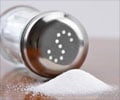Regulations forcing food manufacturers to use lower levels of salt would in theory be far more effective for health than voluntary initiatives or dietary advice for consumers, according

Investigators in Australia looked at the country's "Tick" programme, under which food manufacturers can use a health-promotion logo on packaging if they volunteer to reduce the product's salt content to safer levels.
The team then calculated the impact on public health if the "Tick" limits were made mandatory.
They also looked at studies into the usefuless of programmes that offer salt advice to the general public and to those at high cardiovascular risk.
The team took into consideration the salt content of bread, margarine and cereals; the tonnage of product sold; the average consumption per head of those products; and the costs of drafting and enforcing legislation.
The "Tick" programme scored highly, reducing ill-health by cardiovascular disease across the Australian population by almost one percent -- more than twice as much as dietary advice -- and at a high cost-effectiveness.
Advertisement
Regulations on salt would reduce cardiovascular ill health by 18 percent.
Advertisement
Laws on food content are common in many countries, requiring manufacturers for instance to add iodine to salt and folic acid in cereals.
Cardiovascular disease is the biggest cause of mortality in the world, the study said.
It claimed more than 17 million lives in 2004, a toll that could rise to more than 23 million by 2030.
The study appears in Heart, published by the British Medical Association (BMA).
Source-AFP











